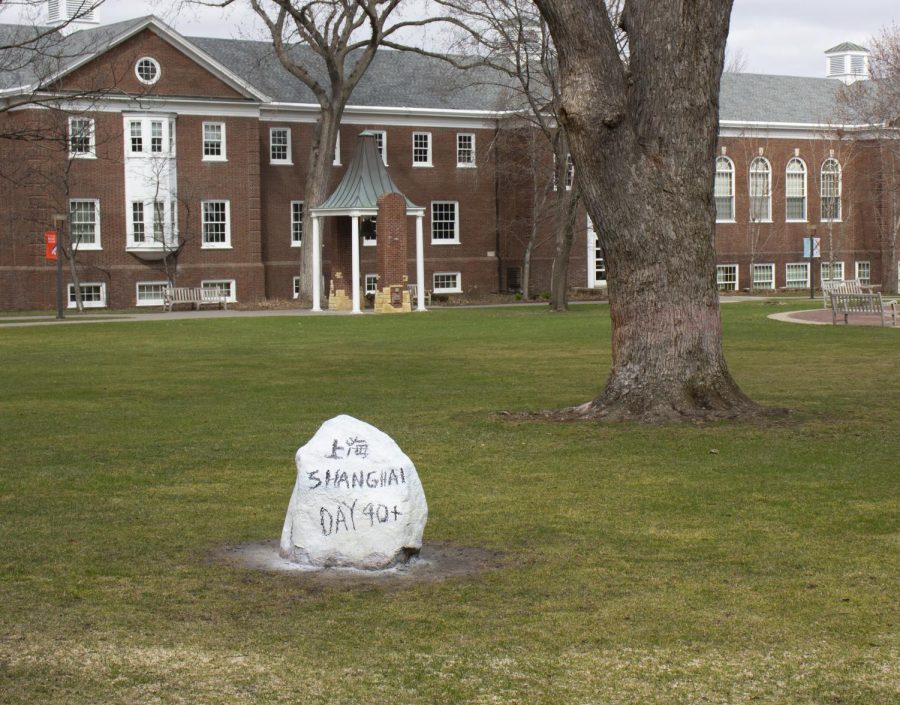Macalester students from China struggle amidst lockdown
April 28, 2022
This contributing writer and all students interviewed for this article chose to remain anonymous for privacy reasons.
Between COVID-19 lockdowns back home, expensive flight tickets and a complicated housing situation in St. Paul, many students from China at Macalester are having an uneasy end of the semester. What support are they getting from Macalester?
COVID-19 lockdowns in Shanghai and many other Chinese cities have been imposed for over a month. There aren’t signs showing that the lockdowns are going to be lifted any time soon.
“At first, I was not worried as lockdown procedures are usually lifted fast, but since April, the policies are getting stricter and it is uncanny,” Penny, who has asked to be referred to using a pseudonym and whose family lives in Shanghai, said. “My mood fluctuates, but generally, I feel depressed and worried.”
Calls for help circulated on Chinese social media platforms like WeChat and Weibo, as many people in lockdown are experiencing food shortages or seeking emergent medical care at a time when medical workers are overworked. These messages can be hard to read for many Chinese nationals at Macalester, and for other students social media is an important source of information.
“We can only access this information through social media, but also because it is filling social media, I force myself to not go through these messages for too long,” Kay, another student who has asked to be referred to using a pseudonym, said. “Otherwise, it’s too traumatizing.”
For the first few weeks, the situation in Shanghai was hardly talked about on the Macalester campus.
“I feel disconnected from the community, as people don’t know or don’t care about [the current situation in China and] I have no one to talk to,” Kay said.
Professors and students are starting to learn more about the current circumstances in Shanghai, but it is never an easy conversation to start with others.
“My professors have given accommodations … as they understand I am going through a complex reality and I need time to deal with the logistics and maintain mental health, yet some professors also believe it is just ‘troubling news,’” Mel, who has also asked to be referred to using a pseudonym, said. “They do not understand the identity crisis we are going through.”
As Shanghai is taking severe measures to control the spread of COVID-19, international flights are being further restricted, adding to the difficulties students from China have been facing for over two years to fly home. Students in the U.S. can only take direct flights from the U.S. into China, and flights can cost between $5,000 and $10,000 and often require strict quarantines up to a month long.
Additionally, there are many COVID-19 tests required before and after arrival at designated test sites, which further increase the cost to go home by several hundred dollars. If students test positive, they will not be allowed to board and will have to book a new ticket for at least six weeks later. Shanghai also recently started requiring airlines to only fly at 40% capacity, instead of its original 75% capacity, thus canceling many tickets and leaving people who secured a ticket to change their flights to a different date.
One graduating senior, Emerson, who has asked to be referred to using a pseudonym explained that their parents had started to search for tickets for them in February and finally secured a ticket for June at the beginning of April from a broker. However, they shared that there is still a level of uncertainty.
“My seat can be canceled any time,” Emerson said. “I’m doing my Masters in another country so I can only stay [in the U.S.] legally until July. That’s why I decided to fly home for the summer.”
Their backup plan, in case their seat is canceled, is to get a tourist visa for the country they are going to for their Master’s program as they will not be eligible for a student visa in that country by the time their U.S. visa expires. Additionally, their lease is ending soon, so if their ticket gets canceled they will have to find somewhere else to stay on short notice.
“I have thought about traveling home but because of the current policies, not only the price of flight tickets has become unaffordable, but there are also many uncertainties,” Julian, another student who has asked to be referred to using a pseudonym, wrote in an email to The Mac Weekly. “I would not take the risk of being tested positive at the last minute and have to come up with another plan to stay in the U.S.”
Some students further emphasized the complexity in the decision of whether or not to return home.
“The cost of a flight ticket is worth 10 months of rent,” Mel said. “I miss the convenience of living back home, but it’s not worth the cost.”
Currently, there are about 139 students from China at Macalester, making up over one third of the international student body. As more students need to stay for the summer, there is a larger demand for summer housing. Combined with those whose plans to fly home are subject to change, students are helping each other to organize necessary last-minute housing options.
“Because I decided to stay in the U.S. for the summer and live off campus, I offered to help other students who need help with storage and moving or need housing for a few days,” Mona, another student who prefers to be referred to using a pseudonym, said.
International Student Programs (ISP) works to support international students through a number of issues including visas, traveling, filing taxes and work permits, and they also offer general support and guidance for international students. Throughout the pandemic, they have noticed the intensified challenges that many international students face. This is especially true for students from China this year and this summer, and ISP has worked hard to support them on an individual basis.
“We pride ourselves on being able to give out individual support, so [our work] is mostly case-by-case,” Director of ISP Aaron Colhapp said. “We are not going to be able to solve everything, but hopefully on some housing issues and storage issues, we’re going to be able to [help].”
On April 22, various administrative staff at Macalester met with students from China over Zoom to discuss the current challenges they are navigating. The meeting was meant to help staff better understand what support students from China need and how the college can better provide that. However, it is unclear what additional actions can be taken to support students other than the work that ISP is already doing.
“We had a meeting with … other staff in administration last week trying to discuss if there are any different forms of support they could provide to students from China, but it seems like we didn’t come up with a concrete idea or solution,” Julian wrote. “I would love to hear more from them in the future.”
As the semester draws to a close, Chinese nationals at Macalester feel like they are unlikely to gain any further clarity around the situation, and they don’t think the college can’t seem to provide a concrete solution.
“They are talking about things we’ve already known and we hoped a better solution would be available from the college,” Julian wrote.














